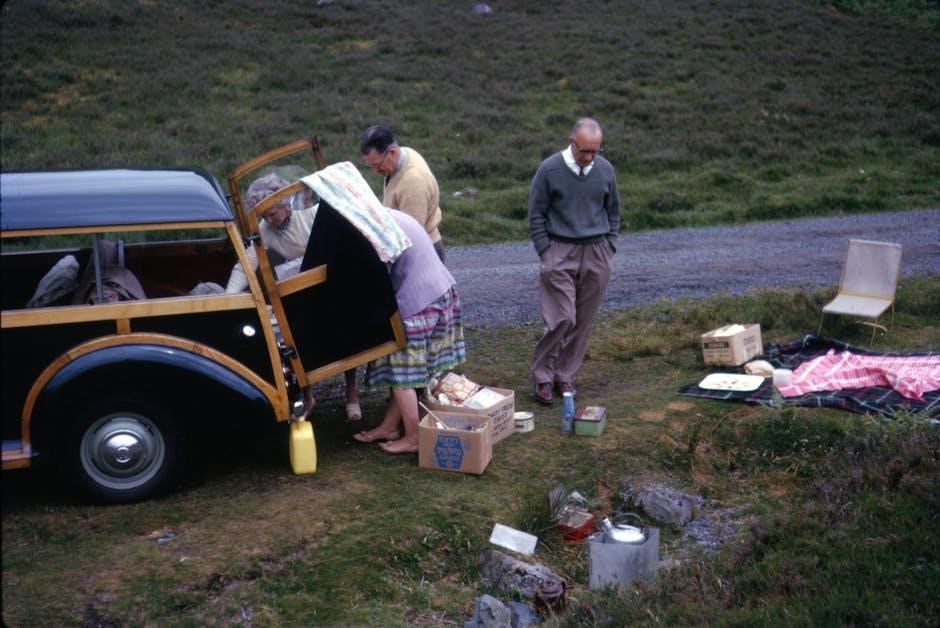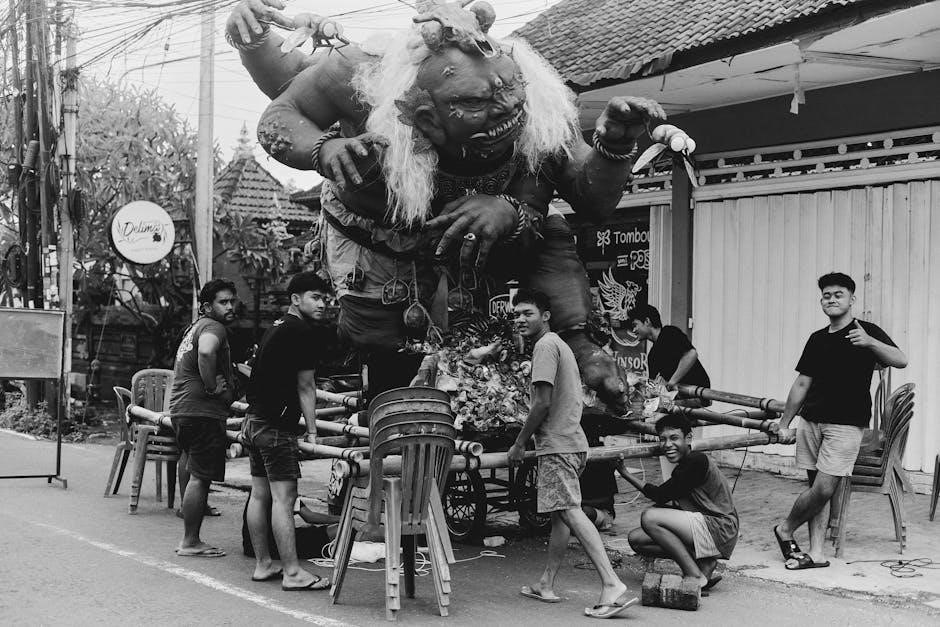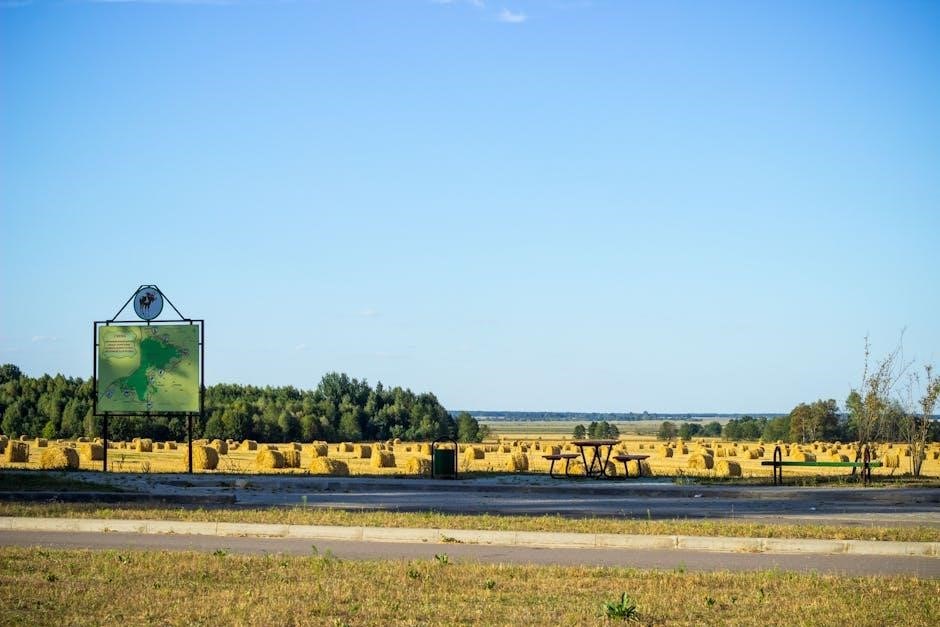Roadside Picnic, written by Arkady and Boris Strugatsky, is a seminal science fiction novel exploring alien visitation and its aftermath. The book, published in 1972, delves into themes of human nature and the unknown, set in a mysterious “Zone” where physics defy explanation. Its complex narrative and philosophical depth have made it a cult classic. The novel is widely available in PDF and other digital formats, including translations, ensuring its accessibility to global readers. This dark, thought-provoking tale continues to inspire adaptations and spark scholarly discussions, cementing its legacy in the sci-fi genre.
Background and Publication History
Roadside Picnic, written by Arkady and Boris Strugatsky, was originally composed in 1971 and first published in 1972 in a Soviet literary magazine. The novel gained popularity for its unique blend of science fiction and philosophical themes, despite initial censorship challenges. The Strugatsky brothers’ work was often scrutinized by Soviet authorities, leading to delayed and truncated publications. The complete version of Roadside Picnic was not widely available until 1980. Its international acclaim grew steadily, with translations into multiple languages, including English. The PDF version, featuring both Russian and English texts, has become a popular format for readers worldwide, ensuring accessibility to this cult classic. Its complex publication history reflects the challenges faced by the authors under Soviet rule.
Setting and Premise
Roadside Picnic is set in a world where aliens have visited Earth, leaving behind mysterious zones where the laws of physics no longer apply. These zones, scattered across six areas globally, are filled with inexplicable phenomena and lethal artifacts. Humanity struggles to comprehend these remnants, which are both fascinating and perilous. Stalkers, rogue explorers, risk their lives to venture into the zones, seeking valuable alien technology. The story follows a troubled stalker, Red Schuhart, as he navigates the dangers of the zone, driven by personal and existential motivations. The setting blends elements of science fiction and psychological drama, creating a haunting atmosphere that challenges the characters’ understanding of reality and humanity’s place in the universe.
Themes and Symbolism in the Novel
Roadside Picnic explores themes of the unknown, alienation, and humanity’s greed for advanced technology. The Zone symbolizes the incomprehensible, challenging human understanding and ethics, while artifacts mirror societal obsessions.
Exploration of Human Nature
The novel delves into human nature through characters’ responses to the Zone, a place where ordinary rules of reality do not apply. It examines greed, curiosity, and survival instincts, as individuals risk their lives for alien artifacts. The protagonist, Red Schuhart, embodies both the allure of the unknown and the moral compromises it entails. The novel highlights how humanity often prioritizes gain over understanding, even in the face of the incomprehensible. This exploration reveals the duality of human nature—both the drive for discovery and the tendency toward self-destruction. Through its characters’ struggles, the book challenges readers to reflect on their own values and the consequences of pursuing the unknown.
The Unknown and the Zone
The Zone, a central element of Roadside Picnic, is a mysterious area left by aliens where the laws of physics are distorted. This enigmatic region is filled with inexplicable phenomena and deadly artifacts, making it both alluring and perilous. The novel portrays the Zone as a place where human understanding is pushed to its limits, highlighting the insignificance of humanity against the vast, incomprehensible universe. The Zone’s unpredictability and the aliens’ indifference to Earth create a sense of cosmic existentialism, leaving characters and readers grappling with the meaning of the visitation. This exploration of the unknown challenges conventional notions of intelligence and purpose, offering a profound commentary on human existence and the search for answers in an indifferent world.

Adaptations of Roadside Picnic
Roadside Picnic has inspired various adaptations, including Andrei Tarkovsky’s film Stalker and the S.T.A.L;K.E.R. video game series, capturing its eerie atmosphere and philosophical depth.
Film Versions and Their Interpretations
Andrej Tarkovsky’s 1979 film Stalker is the most iconic adaptation of Roadside Picnic. The film captures the existential and philosophical essence of the novel, focusing on three men venturing into the Zone; Tarkovsky’s slow, meditative style emphasizes the psychological journey over action, offering a deeply introspective interpretation. Another notable adaptation is the 2017 TV series directed by Alan Taylor, which expands on the original story, introducing new characters and subplots. Both versions explore themes of human nature and the unknown, but differ in tone and narrative focus. The films and series based on Roadside Picnic provide unique perspectives on the Strugatskys’ vision, each enriching the understanding of the source material. These adaptations highlight the timeless appeal of the novel’s complex ideas and atmospheric setting.
Video Game Influences and S.T.A.L.K.E;R. Series
The Strugatskys’ Roadside Picnic has profoundly influenced video games, most notably the S.T.A.L.K.E.R. series. Developed by GSC Game World, the first game, S.T.A.L.K.E.R.: Shadow of Chernobyl, was released in 2007 and immerses players in a hauntingly familiar world. The game captures the novel’s eerie atmosphere, exploring a mysterious “Zone” filled with deadly anomalies and alien artifacts. Players must survive in this hostile environment, uncovering secrets and confronting the unknown. While the game expands on the original story, it remains true to the novel’s themes of human curiosity and the dangers of meddling with forces beyond comprehension. The S.T.A.L.K.E.R. series has garnered a cult following, offering a unique blend of survival horror and philosophical inquiry that resonates deeply with fans of Roadside Picnic.
Availability and Formats
Roadside Picnic is widely available in various digital formats, including PDF, EPUB, FB2, RTF, and TXT. Readers can download it for free or access it online.
PDF Editions and Digital Accessibility
The PDF edition of Roadside Picnic is widely available for download, offering readers easy access to the novel in both Russian and English. Platforms like book networks and rulit.me provide free downloads, while sites such as Internet Archive host scanned versions. The PDF format ensures compatibility across devices, making it a popular choice for readers worldwide. Additionally, the novel is accessible in other digital formats like EPUB, FB2, and TXT, catering to diverse preferences. Its digital presence has facilitated global reach, allowing fans to engage with the story seamlessly. This accessibility underscores its enduring popularity and the demand for Strugatsky brothers’ work in modern formats.

Other Digital Formats and Translations
Beyond PDF, Roadside Picnic is available in multiple digital formats, including EPUB, FB2, RTF, and TXT, ensuring compatibility with various e-readers and devices. These formats are accessible through platforms like book networks and rulit.me, offering readers flexibility and convenience. The novel has been translated into several languages, with the English version translated by Olena Bormashenko providing a faithful rendition of the original Russian text. This accessibility has broadened its audience, allowing readers worldwide to experience the Strugatsky brothers’ seminal work. The availability of these formats highlights the enduring popularity of the novel and its relevance in contemporary science fiction literature.

Cultural Impact and Legacy
Roadside Picnic has left a lasting influence on science fiction, inspiring films like Tarkovsky’s Stalker and video games such as the S.T.A.L.K.E.R. series. Its themes of the unknown resonate globally.
Influence on Science Fiction Genre
Roadside Picnic has profoundly influenced the science fiction genre by redefining how first-contact narratives are explored. Its unique approach, focusing on the aftermath of an alien visit rather than the event itself, has inspired countless authors and creators. The novel’s bleak, philosophical tone and its exploration of humanity’s insignificance in the cosmic scale have set a new standard for introspective sci-fi. The concept of “The Zone,” a mysterious, alien-altered area, has become a cultural touchstone, inspiring works like the S.T.A.L.K.E.R. video game series and Andrei Tarkovsky’s film Stalker. The novel’s themes of uncertainty and the unknown continue to resonate, making it a timeless classic in the genre.
Fandom and Community Engagement
The fandom surrounding Roadside Picnic is vibrant and diverse, with a dedicated global community. Fans engage through various creative outlets, including fan art, cosplay, and fiction inspired by the novel. Online forums and social media groups serve as hubs for discussions, debates, and shared interpretations of the story. The availability of the novel in PDF and other digital formats has further fueled its accessibility, allowing new generations of readers to discover and engage with the material. Community projects, such as fan translations and art collections, highlight the enduring appeal of the novel’s themes and its immersive world-building. This active community underscores the lasting impact of Roadside Picnic on popular culture and science fiction enthusiasts worldwide.

Author Background
Arkady and Boris Strugatsky were renowned Soviet science fiction writers, celebrated for their philosophical depth and social commentary. Their collaborative works, including Roadside Picnic, have left a lasting legacy in the genre.
The Strugatsky Brothers and Their Contributions
Arkady and Boris Strugatsky were influential Soviet authors known for their profound impact on science fiction. Their collaborative works, such as Roadside Picnic, explored complex themes like human nature, technology, and societal structures. The brothers’ unique storytelling style blended philosophical inquiry with gripping narratives, setting them apart in the genre. Their contributions not only shaped Soviet literature but also gained international recognition, inspiring adaptations and scholarly analysis. The Strugatskys’ ability to weave speculative fiction with deep moral and ethical questions has left a lasting legacy, making their works timeless classics in the world of science fiction.
Their Other Notable Works
Beyond Roadside Picnic, the Strugatsky brothers authored several influential works that showcased their unique blend of science fiction and philosophical inquiry. One of their notable novels is The Snail on the Slope, which explores the complexities of human bureaucracy and alien encounters through a fragmented narrative. Another significant work is Prisoners of Power, a tale of political intrigue and rebellion set in a dystopian future. These novels, like Roadside Picnic, delve into themes of freedom, morality, and the human condition, further cementing the brothers’ legacy as masters of speculative fiction. Their writings continue to captivate readers worldwide, offering profound insights into societal and existential questions.
Plot Summary
Roadside Picnic follows a troubled man who guides a writer and scientist into the mysterious Zone, where alien visitation has defied physics, leading to dangerous and transformative discoveries.
Main Storyline and Narrative Arc
Roadside Picnic unfolds in a world where aliens have visited Earth, leaving behind mysterious zones where physical laws no longer apply. The story follows a troubled guide who leads a writer and a scientist into one such zone, seeking to uncover its secrets. As they navigate the perilous environment, they encounter bizarre phenomena and artifacts, challenging their understanding of reality. The narrative explores themes of human curiosity, danger, and the unknown, with the trio’s journey revealing both the allure and the consequences of alien contact. The story’s arc builds tension through their discoveries, ultimately leading to a climax that questions the purpose of the aliens’ visit and humanity’s place in the universe.
Key Events and Conflicts
Roadside Picnic is marked by several pivotal events that drive its narrative. The arrival of aliens and their departure leave behind enigmatic zones, sparking human curiosity and danger. Central to the story is the protagonist’s journey into the zone, where he confronts strange phenomena and moral dilemmas. Conflicts arise from the risks of exploring the unknown, the clash of scientific curiosity with personal survival, and the ethical implications of exploiting alien artifacts. These events highlight the tension between human ambition and the incomprehensible nature of the zone, creating a sense of existential unease. The novel’s key moments underscore the fragility of human understanding in the face of extraterrestrial enigmas.
Character Analysis
The protagonist, Redrick Schuhart, is a complex, determined stalker driven by obsession and survival instincts. His nickname “Red” reflects his distinctiveness. Supporting characters like Kirill and Dr. Pilman add depth, exploring themes of ambition and moral compromise. The novel’s characters embody human resilience and the psychological impact of the unknown, making them relatable yet enigmatic figures in a surreal world.
Protagonist and Supporting Roles

The protagonist, Redrick Schuhart, is a determined and enigmatic stalker, driven by obsession and survival instincts. His nickname “Red” underscores his uniqueness and resilience. Supporting characters like Kirill, a scientist, and Dr. Pilman, a theorist, add depth to the narrative, exploring themes of ambition and moral compromise. These characters navigate the surreal and dangerous Zone, each grappling with their own motivations and fears. Their interactions reveal the psychological toll of the unknown, making them relatable yet enigmatic figures. The dynamic between Redrick and his companions highlights human complexity in the face of the inexplicable, enriching the story’s emotional and philosophical layers.

Character Development and Depth
The characters in Roadside Picnic are multidimensional, with Redrick Schuhart, the protagonist, undergoing significant development. Initially portrayed as a pragmatic stalker, Redrick’s obsession with the Zone evolves into a deeper philosophical inquiry. His nickname, “Red,” symbolizes his unique perspective and resilience. Supporting characters like Kirill and Dr. Pilman add complexity, exploring themes of ambition, curiosity, and moral ambiguity. Their interactions reveal psychological depth, as they grapple with the Zone’s mysteries and their own vulnerabilities. The novel’s focus on character growth and introspection enriches its narrative, creating a sense of emotional connection amidst the surreal and often terrifying setting. This depth makes the characters relatable and memorable, even as they confront the incomprehensible.
Style and Structure
Roadside Picnic features a non-linear narrative with multiple layers, blending first-person accounts and fragmented storytelling. The Strugatsky brothers’ prose is dense and layered, enhancing the story’s enigmatic atmosphere.
Narrative Techniques and Storytelling
The Strugatsky brothers employ a non-linear narrative structure in Roadside Picnic, blending fragmented storytelling with multiple perspectives. This technique immerses readers in the enigmatic atmosphere of the Zone, where the laws of physics are distorted. The novel’s narrative jumps between characters and timelines, creating a sense of disorientation that mirrors the unsettling nature of the Zone itself. The use of first-person accounts and diary entries adds intimacy, while the fragmented nature of the story reflects the characters’ incomplete understanding of the alien phenomena they encounter. This approach enhances the novel’s mystery and philosophical depth, leaving readers to piece together the puzzle alongside the protagonists. The narrative’s complexity is preserved in PDF editions, ensuring the story’s layered meaning remains intact for digital readers.
Language and Translation Challenges
Translating Roadside Picnic into English posed significant challenges due to the novel’s complex linguistic nuances and cultural context. The Strugatsky brothers’ unique prose, rich in Soviet-era slang and idioms, required careful adaptation to maintain the story’s integrity. Olena Bormashenko’s 2012 translation is particularly praised for capturing the original’s gritty tone and philosophical depth. PDF editions of the novel often include annotations to clarify cultural references, ensuring accessibility for international readers. Despite these efforts, some subtleties remain lost in translation, underscoring the difficulties of conveying the novel’s layered meaning across languages. The availability of bilingual PDF versions, however, allows readers to compare the original Russian text with its English counterpart, offering a deeper appreciation of the narrative’s intricacies.

Comparative Analysis
Roadside Picnic is often compared to Andrei Tarkovsky’s film Stalker, which adapts its themes. The novel’s eerie, mysterious tone parallels works like H.P. Lovecraft’s cosmic horror, exploring the unknown;
Similar Works in Literature
Roadside Picnic shares thematic and stylistic similarities with works by H.P. Lovecraft, particularly in its exploration of the unknowable and cosmic horror. The novel’s eerie, mysterious tone and its focus on humanity’s insignificance in the face of the unknown parallel Lovecraft’s themes of cosmic insignificance. Additionally, the novel’s philosophical undertones and its exploration of alien phenomena resonate with the works of Stanislaw Lem, particularly Solaris, which also delves into the complexities of first contact and the incomprehensibility of alien intelligence. The novel’s dark, introspective narrative also aligns with the existential themes found in Jeff VanderMeer’s Annihilation, where an enigmatic, dangerous zone challenges human understanding and survival. These parallels highlight the novel’s influence on and place within the broader science fiction genre.
Differences from Adaptations
The original novel Roadside Picnic differs significantly from its adaptations, particularly in tone and narrative focus. While the book delves deeply into the philosophical and existential themes of alien visitation, film adaptations like Stalker (1979) by Andrei Tarkovsky emphasize visual and atmospheric storytelling over plot. Similarly, the video game series S.T.A.L.K.E.R. expands on the concept of the Zone, introducing new characters and storylines not present in the novel. These adaptations often reinterpret the source material, focusing more on the mystical and survival aspects of the Zone rather than the novel’s introspective exploration of human nature. As a result, the adaptations offer unique perspectives while maintaining the core mystery and intrigue of the original work.

Fan Community
The Roadside Picnic fan community is vibrant, with enthusiasts creating art, writing fan fiction, and engaging in forums. Discussions often revolve around the novel’s themes and the Zone’s mysteries, fostering a shared passion among readers and inspiring creative interpretations of the story’s unique world.
Fan Art and Creative Works
Fans of Roadside Picnic have created a wide range of creative works, from digital art to fan fiction, inspired by the novel’s haunting themes and mysterious Zone. Digital artists often depict eerie landscapes and alien artifacts, capturing the book’s atmosphere. Illustrators focus on key characters and surreal environments, while musicians compose soundtracks evoking the story’s mood. Writers craft alternate endings or prequels, exploring unanswered questions. These works are shared online, fostering a thriving community. Fans also design cosplay and 3D models, bringing the Zone’s enigmatic objects to life. Such creative expressions showcase the novel’s enduring influence and its ability to inspire imagination across mediums.
Forums and Discussions
Online forums and discussions about Roadside Picnic are vibrant and diverse, reflecting the novel’s complex themes and mysterious allure. Fans gather on platforms like Reddit, Discord, and specialized sci-fi forums to debate interpretations of the Zone, its artifacts, and the motivations of the mysterious aliens. Discussions often delve into the philosophical underpinnings of the story, such as humanity’s response to the unknown and the moral dilemmas faced by characters. Enthusiasts also share theories about the Golden Sphere and its purpose, while others compare the book to its film and video game adaptations. These communities foster a deep exploration of the novel, encouraging readers to share insights, fan art, and recommendations for editions or translations of Roadside Picnic in PDF and other formats.

Critical Reception
Roadside Picnic has received widespread acclaim for its profound exploration of human nature and the unknown. Critics praise its philosophical depth and enduring relevance in science fiction.
Reviews and Ratings
Roadside Picnic has garnered widespread critical acclaim for its dark, philosophical, and deeply unsettling narrative. Reviewers praise its exploration of human nature, the unknown, and the consequences of alien contact. The novel’s ambiguous ending and layered symbolism have sparked intense discussions, with many hailing it as a masterpiece of science fiction. Its 2012 English translation by Olena Bormashenko has been particularly praised for capturing the nuances of the original Russian text. Fans and scholars alike commend its ability to blend speculative fiction with profound psychological insights. The book holds a high rating among readers, with many considering it a must-read for anyone interested in thought-provoking sci-fi. Its enduring popularity is evident in its availability in multiple formats, including PDF, ensuring accessibility for modern readers.
Scholarly Analysis and Interpretations
Scholars have extensively analyzed Roadside Picnic for its profound philosophical themes and ambiguous narrative. The novel’s exploration of the “Zone” as a liminal space challenges traditional sci-fi tropes, offering a bleak, introspective view of humanity’s encounter with the unknown. Researchers highlight its critique of scientific hubris and the futility of human curiosity. The Strugatskys’ unique blend of existentialism and speculative fiction has sparked debates about the nature of alien intelligence and its indifference to humanity. Academic studies also explore the novel’s historical context, reflecting Soviet-era anxieties and censorship challenges. The availability of Roadside Picnic in PDF and digital formats has further facilitated scholarly access, enabling deeper textual analysis and comparative studies with its adaptations, such as Tarkovsky’s film Stalker.
